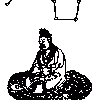-
Content count
334 -
Joined
-
Last visited
-
Days Won
1
Everything posted by damdao
-
One of the first texts that openly (without symbols) discusses this subject, states the neidan teaching (as different from the qigong method) 命蒂从来在真息 It is by Cao Wenyi (1039-1119) and says that the stem of ming is always in True Breath. Of course, what is True Breath is a matter of debate, but it is clear it is not normal breath. I think that northern, southern and central schools agree with it.
-
Generally speaking, it refers to the right name attributed to the right thing; it is a Confucian concept. Rectifying names, measures, and the writing system. Of course, rectifying names implies rectifying the hierarchical order of society, and from that come the right morals or the proper observation of rites.
-
Why do you kept spreading false information? On purpose or simply you don't want to study real sources and with real people?
-
While it is true that not everybody has the obligation to know what neidan is, mainly because it is, perhaps, the less spread of the spiritual systems, the misinformation that qigong and neidan are the same has to be stopped. We know that qigong is a modern umbrella term for several traditional practices more or less adapted (and sometimes diluted). Practices like yangsheng (not to be confused with yangshen), daoyin, neigong (either martial or medical), etc. were fused in one model: qigong. But neidan was not part of this process, although some neidan methods can be found from time to time in qigong systems. Besides, there is the difference in method and energy used (already explained by Antares).
-

Why is all of modern Daoism 'Xuanxue' (neo-Daoism)?
damdao replied to MadePossible's topic in Daoist Discussion
Chapter 1 of DDJ does not speaks about Xuanxue but about Xuan. Xuanxue is a philosophical movement, as Xingshen has pointed out. And maybe your translation is a bit misleading.



